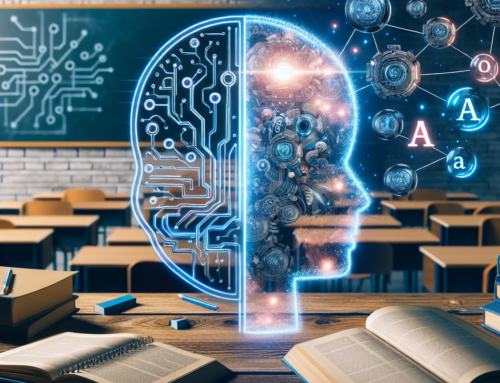In the ever-evolving landscape of artificial intelligence (AI), one entity stands out for its potential to shape the future of this remarkable field: ChatGPT. Developed by OpenAI, ChatGPT is a cutting-edge language model that exhibits an unprecedented ability to engage in human-like conversations. By honing its language proficiency through vast amounts of textual data, ChatGPT has the power to revolutionize various aspects of AI, driving advancements in natural language understanding, virtual assistants, and much more. This article explores the profound influence ChatGPT holds over the future of AI, highlighting its transformative capabilities and the possibilities it unlocks.
Understanding ChatGPT
What is ChatGPT?
ChatGPT is an advanced language processing model developed by OpenAI. It utilizes state-of-the-art deep learning techniques to generate human-like responses in conversations. Unlike its predecessor, GPT-3, ChatGPT is specifically designed to excel in multi-turn conversations, making it an indispensable tool in natural language processing tasks. With its ability to generate coherent and contextually appropriate responses, ChatGPT is revolutionizing the way humans interact with machines.
How does ChatGPT work?
ChatGPT is built upon a deep learning architecture known as a transformer. This architecture allows the model to process and understand large amounts of text data by attending to different parts of the input sequence simultaneously. By training on a vast corpus of data, ChatGPT learns patterns and structures inherent in human conversations, enabling it to generate high-quality responses. The model is fine-tuned to optimize for utility, safety, and proper behavior.
The capabilities of ChatGPT
ChatGPT possesses an impressive range of capabilities that make it a valuable asset in natural language processing tasks. It can answer questions, provide explanations, generate creative responses, simulate characters, translate languages, and aid in brainstorming ideas. The model excels in engaging and maintaining multi-turn conversations, allowing users to interact with it as if they were conversing with a knowledgeable human. This versatility makes ChatGPT a powerful tool in various domains.
Limitations of ChatGPT
Despite its remarkable capabilities, ChatGPT does have certain limitations. It can sometimes provide incorrect or nonsensical answers, particularly when it encounters ambiguous questions or misleading contexts. The model may also exhibit sensitivity to input phrasing, leading to inconsistent responses. Additionally, ChatGPT has a tendency to be excessively verbose and may overuse certain phrases. OpenAI acknowledges these limitations and is actively working to address them through continuous improvements and user feedback.
Impact on Natural Language Processing
Advancements in chatbots
ChatGPT has brought significant advancements in the field of chatbots. Its natural language understanding and generation capabilities allow chatbots to converse more fluently and naturally with users. ChatGPT’s ability to maintain context across multiple turns makes interactions with chatbots much more meaningful and engaging. This improvement in chatbot technology has the potential to revolutionize customer service, virtual assistants, and other applications that rely on human-computer conversation.
Enhanced human-computer interaction
With the emergence of ChatGPT, human-computer interaction is being taken to new heights. ChatGPT’s ability to understand and respond to user queries in a conversational manner allows for more intuitive and user-friendly interactions. This opens up possibilities for applications in voice assistants, smart devices, and other interactive systems. By bridging the gap between humans and machines, ChatGPT is making human-computer interaction more seamless and efficient.
Improved language translation
ChatGPT’s proficiency in generating human-like responses extends to language translation tasks as well. By leveraging its deep learning architecture, ChatGPT can effectively translate text from one language to another, preserving the context and meaning of the original text. This not only enhances communication between people speaking different languages but also reduces barriers to accessing information and resources globally.
Automated customer support
One of the most promising applications of ChatGPT is in the realm of automated customer support. By training ChatGPT on large datasets of customer interactions, it can learn to respond to customer queries, provide troubleshooting guidance, and offer product recommendations. This leads to faster and more efficient customer service, reducing wait times and improving overall customer satisfaction. Moreover, ChatGPT can handle a high volume of customer inquiries simultaneously, ensuring scalability and cost-effectiveness for businesses.
Ethical Considerations
Bias in AI-generated content
As with any AI model, ChatGPT is susceptible to biases present in the training data it learns from. If the training data includes biased or discriminatory content, ChatGPT may inadvertently produce biased responses. OpenAI acknowledges this concern and is actively working to address bias in AI models. They are incorporating techniques to reduce both glaring and subtle biases, and they are soliciting public input and external audits to ensure transparency and accountability in their models.
Potential misuse of ChatGPT
The immense power of ChatGPT also raises concerns about potential misuse. There is a risk that malicious actors may exploit the model to generate deceptive or harmful content, such as misinformation, phishing attempts, or manipulation of public opinion. OpenAI recognizes this issue and emphasizes the need for measures to prevent such misuse. Balancing the benefits of AI technology with responsible usage and safeguarding against malicious intent is crucial to ensuring the positive impact of ChatGPT.
Ensuring responsible AI development
OpenAI is committed to responsible AI development and seeks to mitigate any potential negative societal impact resulting from the use of ChatGPT. They actively conduct research to improve model safety and mitigate biases. OpenAI also prioritizes user feedback and implements measures to address concerns and shortcomings. By continuously refining their models and fostering transparency, OpenAI strives to promote ethical AI practices and contribute positively to the future of AI technology.
Challenges and Concerns
Model limitations
While ChatGPT is an impressive language model, it does have certain limitations that pose challenges. It can sometimes produce incorrect or nonsensical responses, especially when faced with ambiguous queries or unfamiliar topics. The model’s tendency to be verbose can also result in excessively long and convoluted answers. These limitations necessitate ongoing efforts to improve the model’s performance and ensure the accuracy and coherence of its responses.
Safety and security concerns
As AI technology becomes more advanced and widely adopted, it raises concerns about safety and security. ChatGPT, like any AI model, is vulnerable to attacks such as adversarial inputs or manipulations that can lead to biased or harmful outputs. Ensuring the robustness and security of AI systems is crucial to prevent such attacks and maintain user trust. OpenAI is actively exploring ways to enhance model safety and security, including soliciting public input and engaging external experts.
User trust and transparency
Building and maintaining user trust is essential for the widespread adoption and success of AI systems like ChatGPT. Users need to have confidence in the accuracy, reliability, and ethical behavior of the model. OpenAI addresses this concern by actively seeking user feedback and addressing issues promptly. They also strive for transparency by disclosing known limitations and soliciting external input to ensure AI systems align with human values and serve the best interests of users.
Expanding Applications of AI
Assistance in content creation
ChatGPT’s language generation capabilities lend themselves well to assisting in content creation. It can help writers brainstorm ideas, suggest improvements, and provide real-time feedback on drafts. By leveraging the model’s language proficiency, content creators can enhance their productivity and creativity. ChatGPT’s ability to simulate characters and generate coherent narratives also has potential applications in the entertainment and storytelling industries.
Boosting productivity in various industries
The versatility of ChatGPT makes it a valuable tool in boosting productivity across industries. From drafting emails and completing documentation to automating repetitive tasks, ChatGPT can save time and effort by generating relevant and accurate content. By incorporating ChatGPT into workflows, businesses and individuals can streamline their processes and focus on higher-value tasks, ultimately leading to increased productivity and efficiency.
Educational use and personalized learning
In the field of education, ChatGPT holds great promise. It can serve as an intelligent tutoring system, providing personalized assistance to students. By offering explanations, answering questions, and engaging in interactive dialogue, ChatGPT can augment traditional teaching methods. Moreover, the model’s language translation capabilities help bridge language barriers and facilitate access to educational resources for students worldwide. The potential for ChatGPT to revolutionize personalized learning is significant.
Collaboration and Integration
Combining expert knowledge with ChatGPT
ChatGPT can be integrated with existing knowledge bases and expert systems to enhance their capabilities. By leveraging the large amount of information available on the internet, ChatGPT can provide contextually relevant responses and supplement expert knowledge. This integration enables a symbiotic relationship between AI models and human expertise, leading to more comprehensive and knowledgeable AI systems.
Utilizing ChatGPT in research and academia
Researchers and academics can utilize ChatGPT as a powerful tool to augment their work. ChatGPT can assist in conducting literature reviews, generating hypotheses, and aiding in data analysis. Its language generation capabilities make it an invaluable asset for researchers seeking to explore complex topics or engage in collaborative discussions. By embracing ChatGPT, researchers and academics can leverage its capabilities to drive innovation and advance their fields.
Integration with existing AI systems
ChatGPT can seamlessly integrate with existing AI systems to enhance their conversational abilities. By incorporating ChatGPT into virtual assistants, chatbots, or customer support systems, organizations can provide more intuitive and effective user experiences. This integration reinforces the idea of combining specialized AI models with ChatGPT’s broader language understanding, enabling a more comprehensive AI ecosystem.
Addressing the Dark Side
Preventing fake news and misinformation
The rise of AI-generated content, including text, raises concerns about the spread of fake news and misinformation. ChatGPT’s language generation capabilities make it crucial to develop mechanisms to prevent the malicious use of the model for generating deceptive or misleading information. OpenAI is continuously working on refining the model’s ability to discern unreliable sources and evaluate the accuracy of information, with the ultimate aim of minimizing the dissemination of fake news.
Detecting and combating malicious use
To prevent the misuse of AI models like ChatGPT, it is essential to develop robust safeguards and detection mechanisms. By actively monitoring and evaluating the outputs generated by ChatGPT, researchers, developers, and organizations can identify malicious or harmful content. Deploying advanced detection systems and human oversight can assist in combating misuse and maintaining the ethical standards of AI systems.
Protecting user privacy
The collection and storage of user data for AI model training purposes raise concerns about privacy and data security. OpenAI is committed to respecting user privacy and implementing measures to protect sensitive data. By adopting privacy-conscious practices, such as anonymizing and securely managing user interactions, OpenAI aims to strike a balance between improving ChatGPT’s performance and safeguarding user privacy rights. Transparent data handling policies further ensure user trust and confidence in AI technologies.
Continuous Innovation and Improvement
Feedback-driven model updates
User feedback plays a vital role in the continuous improvement of ChatGPT. OpenAI actively encourages and incorporates user feedback to make iterative updates and address model limitations. By creating a feedback loop between users and developers, ChatGPT evolves with the evolving needs and preferences of its users. This iterative process ensures that ChatGPT remains a relevant and valuable tool in natural language processing tasks.
Ongoing research and development
To meet the ever-growing demands and challenges of natural language processing, OpenAI continues to invest in research and development. Through ongoing scientific exploration, OpenAI seeks to push the boundaries of AI technology and unlock new possibilities. By staying at the forefront of research, OpenAI aims to develop models that are increasingly sophisticated, accurate, and dependable, paving the way for advancements in the AI landscape.
User suggestions and discussions
OpenAI actively engages with users through forums, discussions, and collaborations to foster a sense of community and gather valuable insights. By opening avenues for user suggestions and discussions, OpenAI harnesses collective intelligence and diverse perspectives to drive innovation. This collaborative approach ensures that ChatGPT and other AI models are tailored to meet the needs and aspirations of users, thus maximizing their societal impact.
Potential Societal Impact
Job automation and workforce changes
The widespread adoption of AI technologies like ChatGPT has the potential to automate certain tasks traditionally performed by humans. This automation may lead to changes in the workforce, with certain job roles becoming obsolete or requiring a shift in responsibilities. However, it also creates opportunities for new job roles that support the development, deployment, and management of AI systems. It is crucial to anticipate and prepare for these changes, ensuring a smooth transition while prioritizing upskilling and retraining programs.
Enhancing accessibility and inclusivity
ChatGPT’s language translation capabilities and conversational nature can significantly enhance accessibility and inclusivity. By making information available in multiple languages and interacting with users in a conversational manner, ChatGPT bridges communication gaps and facilitates access to knowledge and services for individuals with different linguistic backgrounds or disabilities. This inclusivity can foster equal opportunities and empower marginalized communities.
Shaping future human-AI interaction
As AI models like ChatGPT continue to advance, they are shaping the future of human-AI interaction. Natural language processing models capable of engaging in multi-turn conversations blur the line between human and machine interaction, making AI systems more relatable and intuitive. This evolution has the potential to transform various aspects of human life, ranging from entertainment and customer service to education and healthcare. The future of human-AI interaction is poised to be collaborative, seamless, and mutually beneficial.
Towards an AI-Assisted Future
Embracing AI as a tool
To fully harness the potential of AI technologies like ChatGPT, it is essential to view AI as a tool rather than an autonomous entity. By embracing AI as a tool, humans can leverage its capabilities to augment their own skills and capabilities. This mindset allows for collaboration and synergy between humans and AI, leading to more efficient and innovative problem-solving processes. An AI-assisted future requires recognizing the value of human expertise while harnessing the power of AI technologies.
Coexisting with AI technologies
Coexistence with AI technologies like ChatGPT involves striking a balance between the benefits and ethical considerations of AI. As AI becomes more integrated into various aspects of society, it is crucial to ensure that AI systems align with human values, respect privacy, and mitigate biases. Developing robust regulations, fostering transparency, and engaging in societal discussions can help shape the responsible deployment and use of AI, enabling a harmonious coexistence between humans and AI technologies.
Ensuring AI benefits all of humanity
The ultimate goal of advancing AI technologies is to serve the best interests of humanity as a whole. By focusing on ensuring equitable access, promoting transparency, and addressing concerns related to biases and misuse, AI systems like ChatGPT can be harnessed for the greater good. Collaborative efforts involving policymakers, developers, researchers, and users can help create an environment where AI benefits all, minimizing societal disparities and maximizing the positive impact of AI on individuals and communities.








Leave A Comment